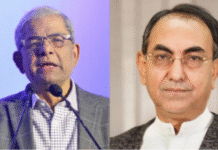THERE is perhaps no other country in the globe that is so disparate in every measurable way from the US and yet that merits so much attention of the lone superpower than Bangladesh.
The US leaders writing off the country as politically and economically untenable at the time of its birth, and taking all possible measures to see that the predictions came true — fingers are pointed at the US for its alleged complicity in the killing of Bangabandhu — the robustness of the current mutual relations has evinced keen interests of scholars, both at home and abroad
We shall try to address the issue on three basic premises: WHAT (is the state of relationship) WHY (did this state come about — the historical perspective) and, HOW (long will this state of relationship last). Perhaps the last two merit more attention than the first because explications of those should help us to chart our future strategy related to the US.
That there has been an unprecedented jump in the bilateral relation over the last few years is an incontrovertible fact. The US is one of the biggest buyers of our readymade garments and thus very deeply associated with how the industry functions. Forty percent of Bangladesh export is with the US and it is perhaps the only country with which we have a favourable balance of trade. US participation in our disaster preparedness efforts including providing aid for developing our infrastructure, its deep involvement in our defense efforts, particularly in the enhancement of our capacity to oversee and manage our maritime boundary and resources, and lastly its shared concern for rise of extremism, stem from the renewed US interest in Bangladesh in the last decade or so. And that interest has found its practical manifestation in the Bangladesh-US partnership Dialogue Agreement signed in 2012.
The natural question that this development provokes is what has changed in the last decade or so that has induced US to close up to Bangladesh. It was described as a place that was becoming ‘quite troubling’ by Condoleezza Rice, the then US Secretary of State, during her visit to India in March 2005, and which she thought would need the joint efforts of India and US to sort out.
So why does Bangladesh matter? The answer lies in the fact that geo-strategic developments in the region of South Asia and the Asia Pacific have accorded Bangladesh a degree of importance. Secondly, the change in US attitude is compelled by the realisation, as can be evinced from the 2010 US defense strategy, that the US cannot go it alone, and in its attempt to address the primary security issues, countries like Bangladesh matter.
Although BD-US relations covers entire gamut of socio-economic issues, the focus of the Partnership Dialogue is predominantly defense and security oriented. In this regard two very important factors motivate the US to seek closer relationship with Bangladesh. Firstly, irrespective of public pronouncements of US’ policy makers regarding peaceful coexistence with China in the Asia-Pacific, there is growing wariness in US of China’s growing clout and influence, particularly on the smaller countries of South Asia. Secondly, the issue of extremism and terrorism is perhaps the factor for the US in charting the country’s foreign policy.
It is therefore no wonder that in the last several years, the US and India have found mutuality of interest in the strategic plane which manifested in the signing of the “New Framework for the US-India Defence Relationship” agreement in July 2005. Needless to say, this agreement had primarily China in mind and which many saw as an alliance that would allow the stronger of the two to dominate the international strategic scenario, particularly in Asia, at the expense of the smaller partner fulfilling a surrogate role only.
In fact, “The robustness of the US-Bangladesh relations runs parallel to an unprecedented upward curve in the trajectory of the India-Bangladesh relationship, which has been lackluster in the recent decades.” Coincidence? The question is will Bangladesh, for its part, be willing to play a surrogate role at the expense of its relationship with China?
As for the how long the current state would last, given the peaks and troughs that we have noticed in US relationship with other countries of South Asia, particularly Pakistan, one is constrained to ask how long would US interest in Bangladesh last? And without sounding pessimistic, one must accept the fact that strategic value is time and situation related. That notwithstanding, it is our hope that Bangladesh-US relationship will stand the test of time.
Source: The Daily Star









